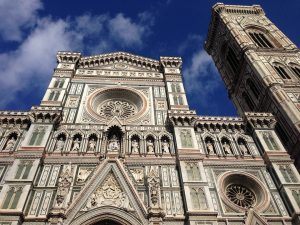Before and during the French Revolution, the intellectual mood of Europe had favored the elevation of “reason” over faith and tradition. Philosophers, scientists, and intellectuals in the salons were united in condemning what they saw as the excesses of Church power, along with its supposed promotion of obscurantist doctrines that prevented the “natural development” of the human condition.
But for every action, there is a reaction. The rationalists of the Enlightenment overstated their case; they had too great a belief in “reason” as a cure for all men’s ills, and forgot that reason itself can become a religion. Men adapt their logic and reasoning to suit their desires; and what may appear to be “rational” may only be our instincts in disguise. The Enlightenment went too far: it forgot that men cannot live on reason alone; he needs a sustaining faith in something bigger than himself to carry him through the inevitable trials of life. Myths, legends, and the pageantry of the Mass are psychological supports that have provided untold benefits to countless generations, and to denigrate this is self-defeating.

The bloody excesses and anti-religiosity of the French Revolution seemed to prove this point. The Romantic movement arose partially in response to the Enlightenment’s contempt for the imagination, myths, and legends that had been part of European culture for centuries. It was only a matter of time before some capable thinker explained just how religion served as a net benefit to the people. That man was author François-René de Chateaubriand, and his book was entitled Génie du christianisme (The Genius of Christianity). It appeared in 1802; the second issue, issued the next year, he prudently dedicated to Napoleon.
We should note here that the word génie does not have the meaning of the English word “genius.” It is more akin to the Latin word genius (from which it is derived), which means “spirit” or “essence.” Chateaubriand’s thesis was essentially that the Church, despite its flaws and occasional crimes, served as such a support to the moral order of society that it was an indispensable part of Western civilization. Where others saw an authoritarian religion crushing the “rational” human spirit, he saw a vital pillar of social order.
He began by summarizing the fundamental doctrines of Catholic Christianity, and expressing his belief in them. A belief in some form of God is necessary, he argued, simply to prevent life from becoming a merciless Darwinian struggle of all against all. Without some higher moral power, nothing at all matters, and anyone can do anything without fear of repercussion. By making the religious believer part of a community united by the common bonds of faith, the Church had brought immeasurable good to the lives of the average person for centuries. Far from liberating the human spirit, atheists had simply enslaved man to anxiety and despair: for if there is no higher power, then man is adrift in a meaningless universe, and his life has no significance.
Taking his cue from Pascal, Chateabriand frankly believed that it was better for a man to believe in some God than to take on faith the impersonal swerving atoms of Lucretius. For even if he is wrong, he will live a happier life than the materialist atheist. How can anyone, he thought, gaze on the glories of the natural world and not think that some divine purpose was behind it all?

But it was in the subject of morals and social order that he found the greatest need for the Church’s firm hand. People cannot be admonished to do good by words alone; there must be something more powerful behind the admonition. Man must both love and fear God; for fear serves just as indispensable a purpose in social order as does love. It would not be enough for Moses to write down some rules and hand them to his people: he had to claim that they were of divine origin, for otherwise people would not take them as seriously. The same applies to the divinely-revealed moral codes of Islam.
No one should see anything cynical or opportunistic in this, Chateaubriand warned his readers. Human passions (lust, greed, selfishness, etc.) are so strong that people will always find ways of justifying their passions with the garb of reason. The moral code (backed by religion) must have a supernatural (i.e., God) sanction if it is to be respected and believed from one generation to the next. This is simply the reality. The values of faith, hope, and charity are more socially cohesive than the individualistic values of lust, greed, and selfishness; so we must make a conscious decision to elevate one set of ethics over another.
Finally, he argues, we should remember that the pursuit of “truth” is not everything in life. Societies that abandon the religions that form the foundations of their civilizations tend to crumble and fall; once we kick out the structural support of religion, then selfishness and greed runs rampant, and society suffers as a consequence. Who can doubt that Chateaubriand here makes a valid point?
The reaction to the Genius of Christianity was generally positive. He argued more from emotion than from reason, but sometimes emotion is more important. Conservatives horrified at the excesses of rationalism and revolution were buoyed by the prospect of finding a philosophical justification for their own preferences; the Church was understandably pleased; and Napoleon, a man of order first and foremost, no doubt nodded his own head in approval at Chateaubriand’s eloquent chapters. His influence on the Romantic movement is undeniable, as is the fact that he helped stimulate the French Catholic revival.
Twenty years after the Revolution tried to purge religion from France, it was back and more powerful than ever. Resiliency is the best measure of worth.
Read More: A Dialogue With A Pious Monk